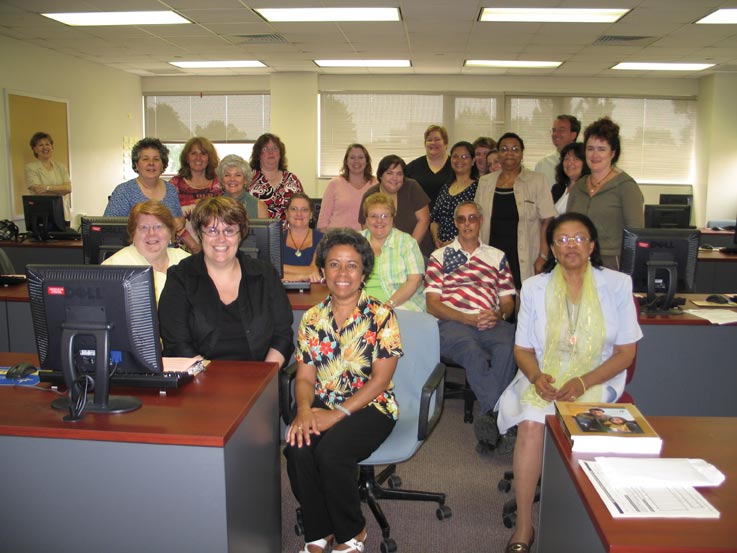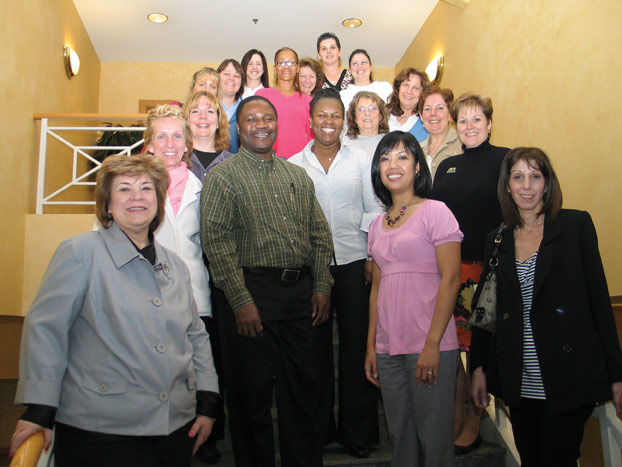LTC Nurses Leading The Way
Institute cultivates long term care leadership skills.
Nancy Leveille, RN, Karen Morris, RN, and Anne O’Brien Carelli, PhD
8/1/2011
 Experienced nurses who consistently provide high-quality care are often promoted in recognition of their clinical skills. These valuable employees are appointed to be supervisors or managers, with the expectation that they will be able to apply their outstanding nursing skills in a leadership role.
Experienced nurses who consistently provide high-quality care are often promoted in recognition of their clinical skills. These valuable employees are appointed to be supervisors or managers, with the expectation that they will be able to apply their outstanding nursing skills in a leadership role.
But how many nurses, especially in long term care, are actually given the opportunity to develop supervisory skills? Do they know how to manage personnel, oversee policies and procedures, and facilitate effective meetings? Are they familiar with the regulations of human resources and the guidelines for conducting agency investigations?
The Foundation for Quality Care in Albany, N.Y., has established the Nurse Leadership Institute for the purpose of cultivating leadership skills in nurses who are employed in long term care facilities.
Affiliated with the New York State Health Facilities Association, the foundation began with one course for directors of nursing (DONs) and now offers at least 11 courses per year for DONs, licensed nursing home administrators (LNHAs), staff development coordinators/nurse educators, and first-line nurse managers.
Participants in the courses are screened for their work experience, references, and motivation to move up the career ladder and lead. Both new and experienced nurses enroll in the courses, which require four to eight weeks of full-day classes.
All of the courses have close to 100 percent attendance, not only because of the quality of the course content and instruction, but because of employers’ commitment to releasing the participants for the day.
The New York State Nurses Association has approved contact hours for most of the courses, and the National Board of Administrators also provides continuing education credits. The State University of New York Institute of Technology has been an active partner and provides college credit for three of the courses—for nurse educator, DON, and advanced DON programs.
“Effective leadership drives quality care,” says Richard Patterson, executive director of the foundation, in describing the purpose of the institute.
“Not only do the nurses develop supervisory skills that build their competence and confidence, their staff benefit from strong leaders who focus on teamwork, communication, and high standards of care.”
Tailored Topics
All of the courses focus on the basic competencies of leadership in long term care settings, such as coordinating quality improvement, solving problems effectively, and managing time and stress.
All other topics are tailored to the level of leadership. For example, participants in the DON program also discuss finance and corporate compliance, legal and ethical aspects of nursing service management, and coaching and evaluation models for improved employee performance.
A new Advanced Director of Nursing program was developed for experienced DONs. Participants explore topics such as root-cause analysis, systems and policies to enhance clinical and financial operations, and human resource issues.
The course for first-line managers, based on eight instructional days, is interactive and realistic. Participants benefit from sharing problems and solutions with their peers, discovering that the same situations show up in many long term care facilities.
As testimony to the effectiveness of the program, 100 percent of the participants have utilized the skills developed in the program, and more than 65 percent cite that their participation in the course has directly influenced their desire to remain in their leadership roles.
Recharging Administrators
The Nursing Home Administrator Leadership course is designed for LNHAs and is not limited to nurses. Participants include administrators who are new to the job, as well as administrators who have been managing long term care facilities for 20 years and are seeking a refresher course.
As basic leadership skills are reviewed, the topics include the 1987 nursing facility reform law (the Omnibus Budget Reconciliation Act) and up-to-date information about state and federal regulations that guide the care of residents.
The federal survey review process is discussed in depth, as are current systems to manage Medicare and Medicaid reimbursement and other financial topics.
In the words of one veteran administrator, “I always left these classes ready to go back to my facility with loads of new ideas.”
The course designed for nurse educators and professional development coordinators is the one with the longest waiting list. In four packed training days, participants learn about principles of teaching, adult learning theory, program and instructional planning, and assessment strategies.
All participants prepare a complete training program that can be used by their colleagues in their home facilities.
As participants noted in the course evaluations, “I have 18 new presentations that I can use to provide education for my staff,” and “I learned a lot from the instructors and other participants. It was worth the time away from my job because now I’m prepared to be more effective.”
Assessments Show Value
All course participants complete assessments to determine increase in knowledge in the topics. The results have shown an overwhelming increase in knowledge.
A surprising result was the number of participants who entered a class believing that they were knowledgeable about a subject and then discovered that they had more to learn.
Senior-level managers were most likely to think that they were up to date and then realized that their peers and instructors could enhance their knowledge.
“I’ve been involved with the development of the Leadership Institute from the very beginning because I felt that it was desperately needed in all areas—DONs, supervisors, and nurse managers,” says Patrick Martone, chief executive officer of Capital Living and Rehabilitation Centres. “Many nurses have strong clinical skills, but they also need leadership skills and to have a global view of what they will be facing in their everyday work life to become strong leaders in the facility.”
By hearing from experts and experienced instructors, says Martone, class participants get a broader perspective and the tools to handle areas in which they have limited experience. “They get to understand the direct linkage between finances and clinical capabilities.”
Evaluations from completed programs indicate that the participants value the substantial amount of content provided in the courses, but they especially appreciate the opportunity to meet and network 
on a regular basis with their peers.
“This is one of the best things I’ve ever done in my career,” says former student Lisa Volk, RN, an administrator and former DON. “The communication and coaching activities, especially the real-life scenarios, gave [students] the opportunity to practice basic skills, play out the problems and solutions, and build confidence so they could go back to work and use the skills successfully.”
Since its inception, the institute has graduated more than 1,100 nurses from the courses.
Spreading The Wealth
The foundation is interested in connecting with nurse training programs in other states to assist them in replicating the Nurse Leadership Institute and to establish possible partnerships for expansion.
Martone notes that replicating the institute’s courses in other states will take “strong support from the top levels of the organization so that participants can be released to enroll in the entire program.”
“It is important to select the right people with the ability to teach—and leaders who have been in the trenches and have the ability to establish a climate of openness and honesty.”
Nancy Leveille, RN, MS, is senior director at the New York State Health Facilities Association (NYSHFA) in Albany and the program coordinator for the institute. Karen Morris, RN, MS, is director of clinical and quality services for NYSHFA and instructor at the institute; and Anne O’Brien Carelli, PhD, is principal with Carelli & Associates, which does program development, instruction, and evaluation for the institute. Contact Leveille for curriculum outlines and information about the courses: (518) 462-4800, ext. 20.